How old is acupuncture?
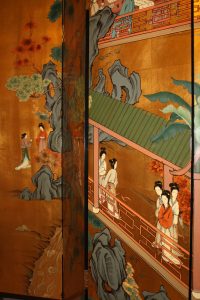 The first formal record of acupuncture was compiled in China between 300 B.C. and 100 B.C., but that compilation is so extensive and complete, and it is obvious acupuncture had been practiced long before that time. Based on recent archaeological discoveries, scholars now believe acupuncture is a rudimentary form may date back 5000, even 7000 years. It’s probably safe to say that acupuncture has been a healing method to some degree at least that long.
The first formal record of acupuncture was compiled in China between 300 B.C. and 100 B.C., but that compilation is so extensive and complete, and it is obvious acupuncture had been practiced long before that time. Based on recent archaeological discoveries, scholars now believe acupuncture is a rudimentary form may date back 5000, even 7000 years. It’s probably safe to say that acupuncture has been a healing method to some degree at least that long.
What are Yin and Yang?
 In Chinese philosophy and culture every entity in the universe carries both negative and positive influences. The negative influence is called Yin, the positive influence Yang. Yin dark, yang light; Yin cold, Yang warm; Yin passive, Yang active; Yin night, Yang day, etc. The shady (Yin) side of a hill balanced by the sunny (Yang) side is a classic example. Yin and Yang are indivisible, never static, always fluctuating. They are the opposing balancing influences of every entity, and with yet another interesting factor: there is always a little Yin in Yang and a little Yang in Yin. This concept flows into Chinese medicine where the symbol for Yin and Yang helps us visualize the balancing act that goes on constantly in every entity of the human body, from the organs and bodily systems to the smallest cell, as well as the vital force itself. If one is to enjoy good health, Chinese medicine teaches that a harmonious balance between Yin and Yang influences must already exist in organs and meridians, or it must be attained. The attainment of such harmony is the goal of acupuncture treatment.
In Chinese philosophy and culture every entity in the universe carries both negative and positive influences. The negative influence is called Yin, the positive influence Yang. Yin dark, yang light; Yin cold, Yang warm; Yin passive, Yang active; Yin night, Yang day, etc. The shady (Yin) side of a hill balanced by the sunny (Yang) side is a classic example. Yin and Yang are indivisible, never static, always fluctuating. They are the opposing balancing influences of every entity, and with yet another interesting factor: there is always a little Yin in Yang and a little Yang in Yin. This concept flows into Chinese medicine where the symbol for Yin and Yang helps us visualize the balancing act that goes on constantly in every entity of the human body, from the organs and bodily systems to the smallest cell, as well as the vital force itself. If one is to enjoy good health, Chinese medicine teaches that a harmonious balance between Yin and Yang influences must already exist in organs and meridians, or it must be attained. The attainment of such harmony is the goal of acupuncture treatment.
What are meridians?
Several thousand years ago Chinese physicians discovered that Qi, the vital force, circulates throughout the body along fourteen major channels, twelve of which are duplicated on the left and right sides of the body. The two other major channels are located in the center of the body, with one in the front, and the other in the back. There are also a number of so-called Extra Channels and Miscellaneous Channels throughout the body. Meridians form a highly complex invisible network transporting and directing Qi to every part of the body including the head, arms, legs, torso, organs and systems. Good health depends on a balanced circulation of Qi throughout the meridians.
What are the Acupoints?
The Acupoints are the areas along a meridian where the energy comes together and rises to the surface of the body. It can therefore be more easily accessed and re-directed with the use of a needle.
What is Qi, and what does it do?
Qi means energy, and although Qi is invisible, its presence becomes especially apparent in the working of the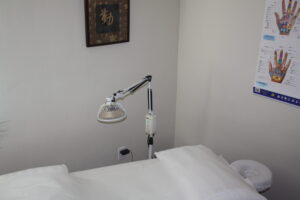 bodily organs and systems which require prodigious amounts of energy. Yet, the Chinese view Qi not only as powering a function, but as inseparable from function as though there is no Qi without function and no function without Qi. Qi is also known as the lifting force, and since the total absence of Qi is death, obviously one’s good health depends on a balanced distribution of Qi throughout the meridian network that influences the organs as well as the bodily systems: skeletal, muscular, endocrine, circulatory, digestive, respiratory, urinary, reproductive, and nervous. When Qi flows smoothly and harmoniously throughout the meridians, each bodily system and organ interacts with and affects all the other systems and organs, which in turn are interdependent, interrelated, and integrated. Everything works together to make us feel whole and healthy. Acupuncture treatment is to balance and enhance your Qi in your body.
bodily organs and systems which require prodigious amounts of energy. Yet, the Chinese view Qi not only as powering a function, but as inseparable from function as though there is no Qi without function and no function without Qi. Qi is also known as the lifting force, and since the total absence of Qi is death, obviously one’s good health depends on a balanced distribution of Qi throughout the meridian network that influences the organs as well as the bodily systems: skeletal, muscular, endocrine, circulatory, digestive, respiratory, urinary, reproductive, and nervous. When Qi flows smoothly and harmoniously throughout the meridians, each bodily system and organ interacts with and affects all the other systems and organs, which in turn are interdependent, interrelated, and integrated. Everything works together to make us feel whole and healthy. Acupuncture treatment is to balance and enhance your Qi in your body.
What happens when the flow of Qi becomes blocked?
Qi is meant to flow freely throughout the meridian network carrying its balanced vital force to all the body’s parts, organs, and systems, thereby encouraging them to function with each other in a natural, harmonious way. That leads to good health. But any sustained blockage or other disruption of a balanced flow or distribution of Qi may bring on pain, a weakened immune system, and ill health.
It’s important to realize that while such blockage causes diminished Qi in one organ or part, it may also cause excessive buildup of Qi in another area. That phenomenon can be understood by visualizing a meridian carrying Qi as like freeway carrying cars. On a freeway we know what happens when one or more lanes become blocked. It’s a similar idea on a meridian. A blockage may cause a deficiency of Qi beyond the blockage and a buildup of Qi behind the blockage, which may mean diminished activity of some organs and accelerated activity of others. Either way, Qi is unbalanced, so its flow must be normalized through an acupuncture or herbal treatment.
How does the flow of Qi become blocked or unbalanced?
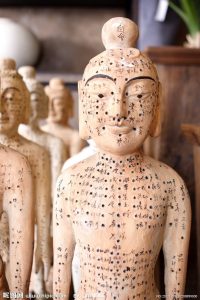 The desired balance in the flow of Qi can be affected by any various substances, both external and internal, including poor nutrition, adulterated food, toxic air or water, infectious or contagious diseases, malfunction of an organ, ergonomic or overuse injuries, as well as home, work, sports, and auto injuries. Excessive dampness, wind, cold, heat; even emotional responses to life such as worry, anxiety, anger, sadness, and stress may affect Qi’s flow through the meridians.
The desired balance in the flow of Qi can be affected by any various substances, both external and internal, including poor nutrition, adulterated food, toxic air or water, infectious or contagious diseases, malfunction of an organ, ergonomic or overuse injuries, as well as home, work, sports, and auto injuries. Excessive dampness, wind, cold, heat; even emotional responses to life such as worry, anxiety, anger, sadness, and stress may affect Qi’s flow through the meridians.
What can be done about blocked, unbalanced Qi?
After the initial consultation and examination, I will complete the diagnosis and begin carrying out the treatment plan. The objective is to normalize the flow and distribution of Qi and balance its circulation by stimulating the selected acupoints via needles or other means, herbal therapies may be prescribed as needed.
Are acupuncture’s results due to hypnotic suggestion?
Any form of therapy carries the potential of a positive psychosomatic (mind-body) response. However, the highly successful use of acupuncture in veterinary medicine demonstrates that hypnotic suggestion plays no role in acupuncture healing. It’s important to keep in mind, though, that Chinese medicine is guided by a fundamental belief in the whole body concept of health, which involves the inseparable relationships of the body, spirit, emotions, and mind.
Are there different styles of acupuncture?
Yes, there are. Acupuncture originated in China but has spread to Korea, Japan, Vietnam, Europe, the British Isles, and America. In different countries, different styles have developed based on differing opinions on theory and technique. I have trained and practiced in China and my practice is in a Chinese style. However, I have taught in different acupuncture schools and I am familiar with different styles. According to a patient’s condition and preference, I may adapt the style I use.
 What criteria should one use in choosing an acupuncturist?
What criteria should one use in choosing an acupuncturist?
Patients should ask about where the practitioner trained, how long the training was, how long he or she has been in practice, and what experience the practitioner has had in treating the patient’s specific ailment. And the practitioner should be currently certified or licensed in the state.
How deep do the needles go?
The depth depends upon the nature of the problem, the location of the points selected, the patient’s size, age, and constitution, and the acupuncturist’s style or school. Usually, needles are inserted from ¼ to 1 inch in depth.
Does acupuncture hurt? What does it feel like?
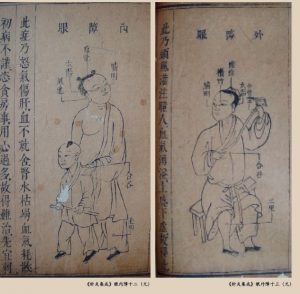 Acupuncture needles are very fine, not much thicker that a human hair. People’s experience of acupuncture varies and can include some mild, but temporary discomfort like a mosquito bite, or a feeling of a slight electrical impulse. Many people report entering a state of relaxed awareness, and other fall asleep during treatment. Some people are super sensitive and receive fewer and even thinner needles, while others may not feel much at all. While most acupuncture is not painful, some of the deeper treatments of certain illness can involve some discomfort sensation. You may feel some soreness, tingling, distension, and slightly aches; it is called the feeling of arriving Qi, the Qi is going to spreading along the meridian to balance the energy of human body. If I feel your condition warrants this type of treatment, I will discuss it with you thoroughly before proceeding. You should feel free to tell me what you feel and what you prefer in order to utilize the most effective and applicable technique.
Acupuncture needles are very fine, not much thicker that a human hair. People’s experience of acupuncture varies and can include some mild, but temporary discomfort like a mosquito bite, or a feeling of a slight electrical impulse. Many people report entering a state of relaxed awareness, and other fall asleep during treatment. Some people are super sensitive and receive fewer and even thinner needles, while others may not feel much at all. While most acupuncture is not painful, some of the deeper treatments of certain illness can involve some discomfort sensation. You may feel some soreness, tingling, distension, and slightly aches; it is called the feeling of arriving Qi, the Qi is going to spreading along the meridian to balance the energy of human body. If I feel your condition warrants this type of treatment, I will discuss it with you thoroughly before proceeding. You should feel free to tell me what you feel and what you prefer in order to utilize the most effective and applicable technique.
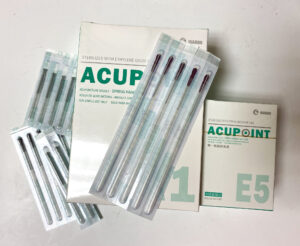 Are there side effects to acupuncture?
Are there side effects to acupuncture?
Possible side effects from acupuncture occur infrequently and are generally mild. They can include slight bleeding or bruising at a needle insertion site or lightheadedness. Supporting techniques, such as cupping, can leave temporary red marks on the skin, but I will inform you of this and get your permission before proceeding. This being said, sometimes acupuncture can cause your symptoms to temporarily worsen before significantly improving. This is called a “healing crisis”, and should last no more than two to three days. If your symptoms worsen and do not improve after three days, please contact me immediately.
Are acupuncture needles sterile and safe?
Only sterile and disposable needles are being used in this clinic.
What will happen at the first visit and how long does each treatment take?
 The initial visit takes about one hour and fifteen minutes. During your initial visit, we will: go through your major complaints and other health issues, answer your concerns and questions, examine your tongue and pulse, give a TCM diagnosis, and discuss a treatment plan. Acupuncture treatment will be offered after the consultation, and I may recommend some Chinese Herb or give other recommendations as needed.
The initial visit takes about one hour and fifteen minutes. During your initial visit, we will: go through your major complaints and other health issues, answer your concerns and questions, examine your tongue and pulse, give a TCM diagnosis, and discuss a treatment plan. Acupuncture treatment will be offered after the consultation, and I may recommend some Chinese Herb or give other recommendations as needed.
Treatments afterwards average about one hour per session. During these visits, we will provide additional acupuncture treatment and suggestions after observing each individual’s reaction.
How often do I have to come and how many treatments do I need?
Acupuncture will work in an accumulative affect, similar to chiropractic and physical therapy treatment.
The number and frequency of treatments may vary, because each patient’s health problems and response to treatment are unique. Usually, the recommendation is one to two treatments per week for four to ten treatments. In general, acute conditions require less treatment than chronic conditions. Some patients may respond favorably after only one or two treatments. Some may not improve until the fourth or sixth visit. Your treatment course will be determined after the first visit and reassessed after each session.
Can I receive Acupuncture when I am pregnant?
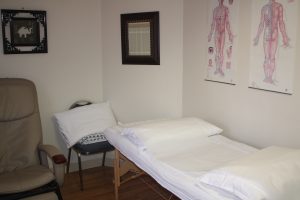 Yes. Acupuncture is a good method to maintain general health during pregnancy, and can help to manage body pains, morning sickness, digestive issues, fatigue, depression, and reduce miscarriage risk. Because there are some points that are contraindicated during pregnancy, it is important to inform me if you are pregnant or planning on becoming pregnant.
Yes. Acupuncture is a good method to maintain general health during pregnancy, and can help to manage body pains, morning sickness, digestive issues, fatigue, depression, and reduce miscarriage risk. Because there are some points that are contraindicated during pregnancy, it is important to inform me if you are pregnant or planning on becoming pregnant.
Also, acupuncture is a safe and effective method to prepare for labor. It can be used to adjust an unfavorable fetus position, reduce the pain during labor, and induce an overdue labor. Many midwives have referred patients to me because of success in this field.
What should I prepare and wear for my session?
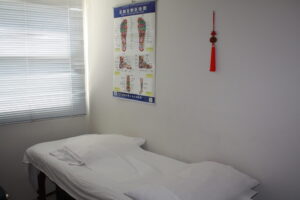 It is best to wear shorts or loose clothing so that the arms and legs below the elbows and knees, as well as the abdomen, are accessible. Gowns and towels are available to use in my clinic.
It is best to wear shorts or loose clothing so that the arms and legs below the elbows and knees, as well as the abdomen, are accessible. Gowns and towels are available to use in my clinic.
I advise against strong perfume and heavy make-up, because a natural facial complexion and body odor will be useful for your diagnosis, and other patient may have severe allergy reactions to your perfume.
Also, do not brush your tongue for the treatment, because I will observe you tongue color and coating to determine your general health. Do not wear excessive jewelry, as you might be asked to remove your watches, bracelet and/or earrings in order to access acupoints.
Do not engage in strenuous activity, drink alcohol, smoke excessively, or ingest heavy meals before or after your treatment. This will allow the body to adjust the effects of the acupuncture.
It is best to eat a light meal before your appointment so that your body has energy to work with. Sometimes a person who is starving may become super sensitive to needles, leading them to feel lightheaded or weak when receiving an acupuncture treatment, especially when they have been suffering prolonged excruciating pain, lack of sleep, with no breakfast. In this case, inform me immediately and I will take the appropriate actions.
What kind of insurance do you accept?
I accept some major health insurances, such as Horizon BCBSNJ direct, Horizon BCBS traditional plan, Horizon BCBS federal plan, Horizon BCBS PPO, CIGNA, OXFORD, No Fault MVA insurance, and Veterans Affairs coverage. Please call your insurance company to verify your benefits before your visit. Do not rely on the information from a website, because insurance benefits may have subtle variations based upon plan and group.
If your insurance has coverage for acupuncture however is not listed above, where payments are made directly to the patient, we will provide the necessary paper work so that patients can submit their claims themselves to get re-imbursement.
I do offer a discount rate for patient who has no insurance coverage.
Do you accept Medicare, Medicaid, or AARP?
These insurances have had no coverage for acupuncture services, and therefore I do not accept these insurances.
What kind of payment do you take?
The payment or copay is due after the treatment completed. We offer discount rate for patient who has no insurance coverage. We mainly accept check or cash as payment.
Do you treat auto accident /personal injury insurance patients?
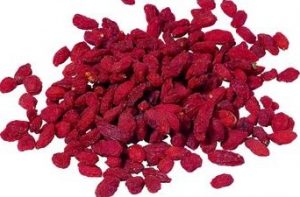 Yes. Whiplash, neck pain, back pain, headache, and other pain related to Motor Vehicle Accidents are covered by your motor vehicle insurance. Acupuncture is very beneficial for pain management, and patients can even get treatment in conjunction to chiropractic and physical therapy; often healing faster with this combination. We need you provide the name and phone number of your Motor Vehicle insurance company, your claim number, and your case manager to apply authorization for such acupuncture treatment. If the claim is still open, you are eligible for treatment.
Yes. Whiplash, neck pain, back pain, headache, and other pain related to Motor Vehicle Accidents are covered by your motor vehicle insurance. Acupuncture is very beneficial for pain management, and patients can even get treatment in conjunction to chiropractic and physical therapy; often healing faster with this combination. We need you provide the name and phone number of your Motor Vehicle insurance company, your claim number, and your case manager to apply authorization for such acupuncture treatment. If the claim is still open, you are eligible for treatment.
How are Chinese herbal medicines taken?
The traditional method of taking Chinese herbal medicine is drinking a decoction prepared by boiling the selected herbs. There are also herbal pill, granule extracts, and capsules for those who do not have the time to cook or may not accept the bitter taste of herbal decoction. It is very convenient to be taken and it is effective and suitable for both adults and children.
Do Chinese herbal medicines have side effects?
Most of the components of Chinese herbal medicine have a very low toxicity compared to the common or over the counter Western drugs, when they are prescribed according to a correct TCM pattern diagnosis from a qualified herbalist. I only use the herbs that follow the USA standards and regulations. They should have few side effects, if any, and only beneficial healing results. If you experience any discomfort while taking Chinese herbal medicine, discontinue usage and let me know, so that I may modify the prescribed formula until there is no side effect.
Can pregnant women take Chinese herbs?
A professional TCM practitioner can write prescriptions that are appropriate for pregnant women and lactating mothers. Chinese herbal medicine is a great supplement for mother and children’s health; I offer postpartum herbal care for new mothers to restore their energy and health.
How long does it take to see results with Chinese herbal medicine?
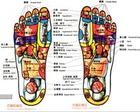 In acute conditions, results may occur in a matter of hours. In chronic conditions, some results should be seen within two weeks. Although chronic conditions may require taking Chinese herbal medicine for a long time, signs that the medicine is working should be apparent to the patient and practitioner alike almost from the very start.
In acute conditions, results may occur in a matter of hours. In chronic conditions, some results should be seen within two weeks. Although chronic conditions may require taking Chinese herbal medicine for a long time, signs that the medicine is working should be apparent to the patient and practitioner alike almost from the very start.
How do I know if a practitioner is professionally trained in Chinese herbal medicine?
Although Chinese herbal medicines are safe when prescribed by a trained, knowledgeable practitioner, they are strong medicine. Patients should ask about where the practitioner trained in Chinese Herbal Medicine and how long the herbal training was, how long he or she has been in practice with Chinese herbal medicine, and what experience the practitioner has had in treating the patient’s specific ailment with Chinese Herbal Medicine. Many certified acupuncturists in New Jersey have no training in Chinese Herbal Medicine.

